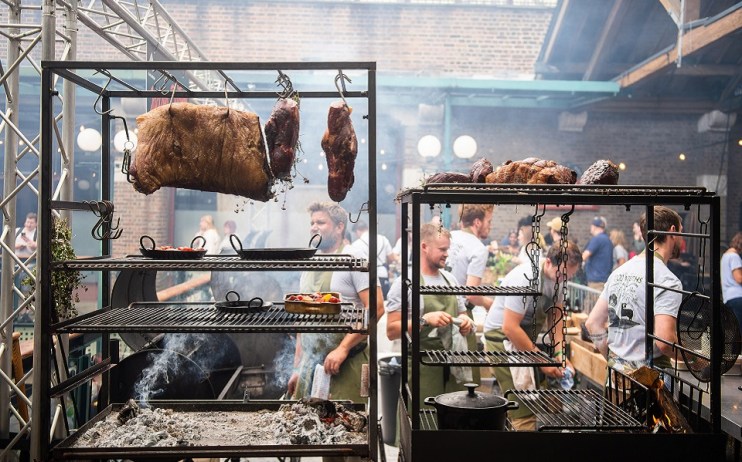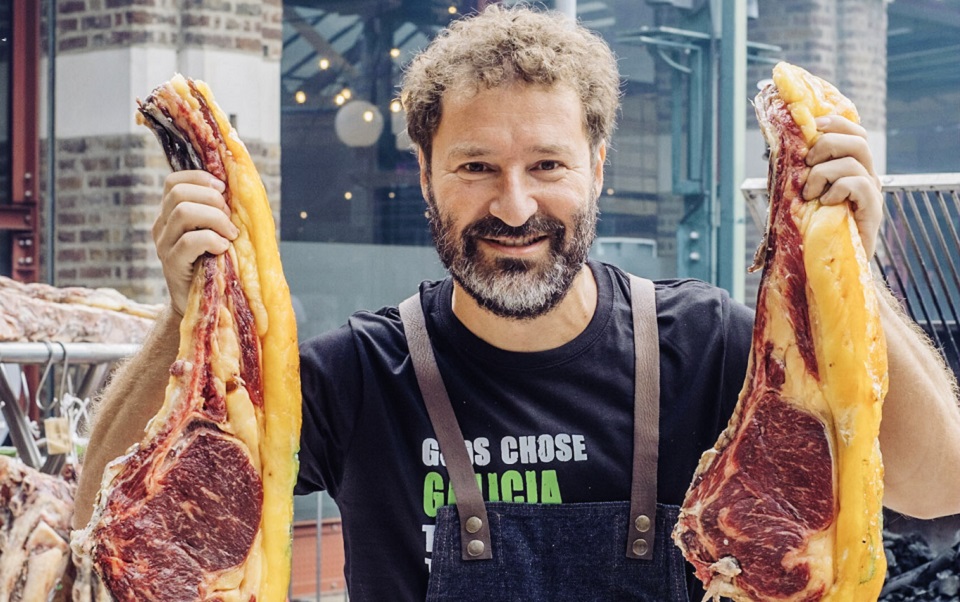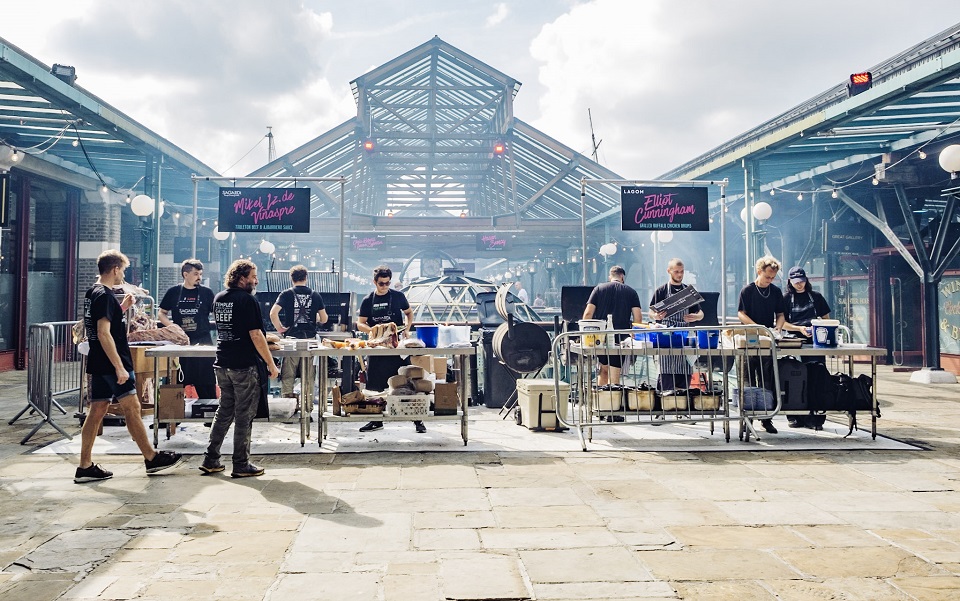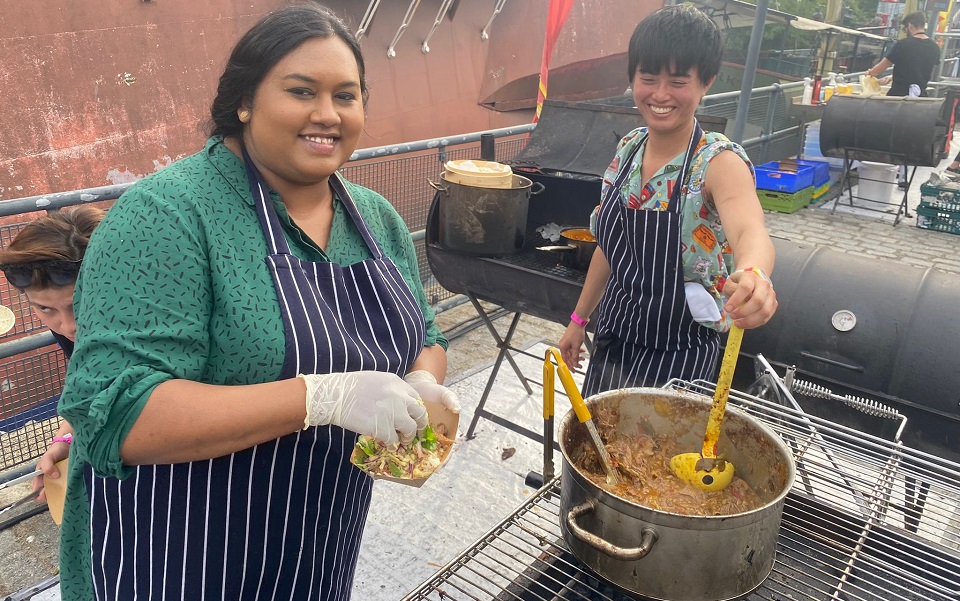Tasting rare 16-year-old beef at Meatopia food festival

Thick wafts of smoke cover me in the sweet smell of resin and meat. The translucent shapes of the fumes drift skywards from more than a dozen barbecue grills. I’m at Meatopia on the top floor of Regency-era warehouse Tobacco Dock, a fitting name for the sight I see around me.
Halfway along the top floor, Mikel Viñaspre and his brother Iñaki are labouring over one of the barbecues. A 16-year-old cut of steak the brothers claim is the oldest in London is the focus of their attention. Soon after, Iñaki sips on a dry, light red, shares it with us and cuts the meat on a silver tray that’s fittingly theatrical.
Industrial farming means this meat is going to be history. Something that happened once.
Mikel Viñaspre on the reduction of traditional dairy farming methods, such as those that produce this 16-year-old meat cut. Industrialisation means more meat at worse quality that’s worse for the environment
Smiling, he hands me a cut that’s four-inch-long and dangling from a fork. “It’s impossible to raise something like this,” he says of the meat. “It’s going to be history. Something that happened once.” Behind us, hordes queue to buy a 10-year-old cut of beef from the brothers without a clue that we’re secretly eating something even more special.

Industrial farming is killing the traditional Basque way of raising the type of beef I’m chewing. Dairy cows like the ones these brothers use at the Sagardi restaurant in Shoreditch for their premium flavour have to be kept alive, and fed, for much longer.
The Basque Country has a strong cultural heritage of rearing cows into their teenage years, of cooking, as Mikel puts it, “old fat cows,” but even in rural Spain, the tradition is dying. Most industrially-farmed beef is around 18 months old at the time of slaughter. Higher quality cuts derive from dairy cows that may live to four or five. At this age cows typically stop being useful in intensive farming conditions because of their age.
The cost of keeping and feeding a cow to age 16 is unfathomable to most farmers. But for the Viñaspre brothers, “the older the better,” no matter the cost, and they have spent nearly three decades nurturing relationships with the few remaining Basque farmers that nurture their dairy cows into old age. “It’s something very, very special,” says Mikel. “You can eat the fat, it’s healthy. It melts at 30 degrees celsius, a very low temperature, and the flavour is amazing.”

The duo has built a 27-year relationship with an 82-year-old Basque farmer who’s managed to stay independent. Recently, he decided to slaughter this particular aged animal, so he called the Sagardi brothers to see if they’d like a loin. The octogenarian is the sort that only sells beef to people he has known for decades.
“It’s a very strong relationship,” says Mikel. “You can’t go there and say: ‘I have a lot of money, I want to buy this animal.’ No, no.” The meat has a marbled look and a deeper, more complex taste than a typical high-quality steak. It has a long aftertaste too that means the flavour develops in the mouth, and the beef pairs excellently with a quaff of the red Iñaki keeps topping me up with.
The brothers claim to serve London’s oldest cuts of steak, with 12- year and 10-year Basque cuts permanently on the menu at Sagardi. But this 16-year is so special, and promotes such a sustainable way of eating meat for the future, that they have invited their most loyal customers for private tasting events for the two days following Meatopia.

At Meatopia, London’s best restaurants serve small plates that amplify their cooking styles. The Mauritian Chaya Pugh, a recipe developer for Ottolenghi, and her all-female team served me mutton with coconut, chilli and lime rice in the shadow of the titular and seismic 18th century clipper boat that is this venue’s namesake.
There was more red meat, and another energetic female team cooked me perfect chicken wings with a hedonistic peanut butter sauce. The queues for Hawksmoor circled around the lower echelons of the old building, where Irish folk bands played during the day and, later, DJs brought out their decks for people to dance.
Meat can understandably get a bad wrap, but a careful approach to carnivore culture typifies the Viñaspre brothers’ approach to Meatopia, and the result is genuinely special.
Meatopia returns to Tobacco Dock next 1 -3 September and tickets will be on sale in November
